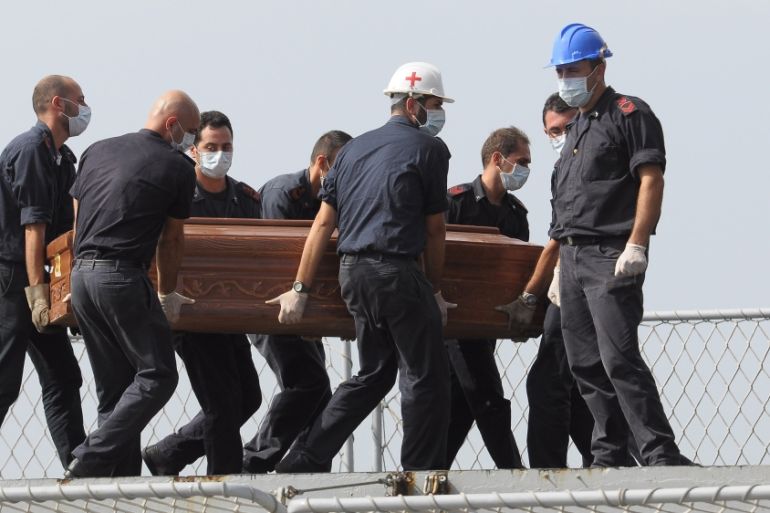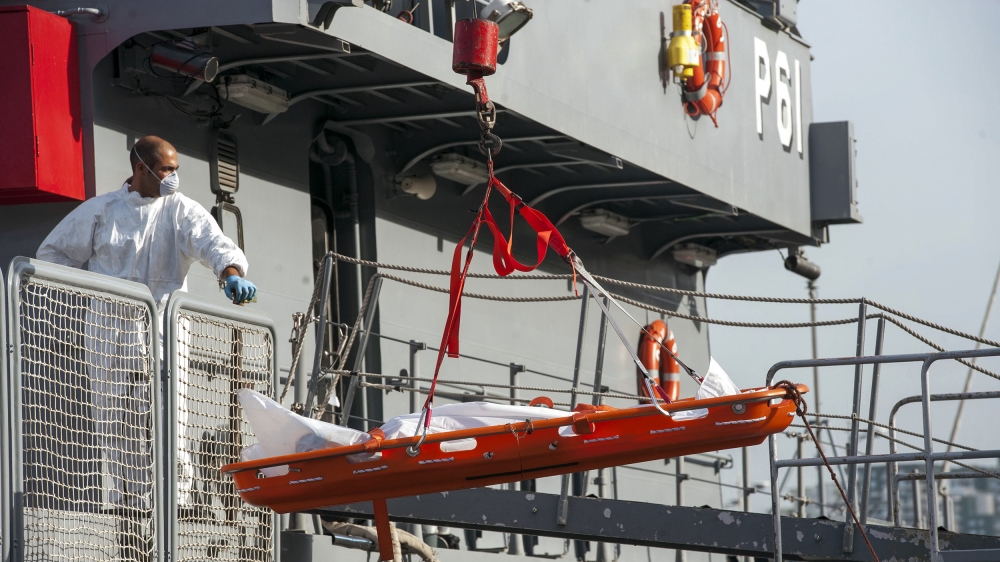Will Italy prosecute officials for the 2013 shipwreck disaster?
At least 268 people – mostly Syrian refugees – died in the Lampedusa shipwreck in October 2013, including 60 children.

Update: Since this article was first published, the judge announced the verdict would be delayed until September 16.
Rome, Italy – Hatem Shabaan hopes justice is near. Six years ago, he lost his wife and two of his four children at sea.
Keep reading
list of 4 itemsUK police arrest three over deaths of five people in English Channel
UK passes bill to deport asylum seekers to Rwanda: What’s next?
‘Can’t give them jobs’: Rwandans grapple with fears over UK asylum plan
They were on board a refugee boat that capsized near Italy in October 2013, after they had called for help for hours. Rescuers arrived late.
“I lost my family right before my eyes in the sea,” he says, fighting back tears.
The 38-year-old Syrian refugee now lives in Germany.
“No human being can bear this.”
At least 268 people died in the Lampedusa shipwreck, including 60 children. They were mostly Syrians fleeing war and persecution at home.
Six years on, nobody has been found guilty of their deaths.
But that could change soon.
On Monday, a court in Rome will decide whether to prosecute two high-ranking officials of the Italian Navy and Coast Guard, Luca Licciardi and Leopoldo Manna, for the delays in the rescue operations, on charges of manslaughter and negligence.
The case could mark the first time that families of boat disaster victims find justice.
If there is justice, at least we should have reparations.
The case is taking place against a backdrop of rising nationalism in Italy, with far-right Interior Minister Matteo Salvini having secured 34 percent of the vote in the May European elections after repeatedly attacking NGO rescue operations and occasionally barring migrant boats entering Italian ports.
Delays in rescue operations continue to happen, underscoring the significance of the case.
“This is not an isolated episode,” says Luca Masera of the Association for Juridical Studies of Immigration (ASGI) and an associate professor of criminal law at the University of Brescia. “This case from the past should sound the alarm about what’s happening today.”
‘We are dying’
The people on board the boat first called Italian authorities at around noon on October 11, 2013. They had been at sea for hours.
Hundreds had left from Zuwara, Libya the night before. A Libyan patrol boat had reportedly chased them down and fired at them, hitting a few passengers as well as the hull, which started taking in water.
Mohanad Jammo, a Syrian doctor on board, called the Italian coastguard.
His calls – compiled into a video by the Italian weekly L’Espresso – describe the passengers’ desperation.
“We’re taking in water, we’re in danger, please help us,” he said at 12:26pm.
At 1:17pm: “Did you send anyone for us?”
Later, at 1:48pm: “We are dying!”
We want them to ask themselves: Was it right to leave children go missing at sea in the name of not intervening?
The boat was about 60 miles from Lampedusa, Italy, and almost 120 miles from Malta, but in an area of Maltese responsibility, so the Italians repeatedly told Jammo to call Malta instead. They asked Malta to take control of the operations.
The operations started sluggishly as Maltese authorities assessed the course of action.
By around 4pm, Maltese authorities had requested that Italy send one of its navy vessels to rescue the Syrians – a normal practice in rescue operations when a vessel is significantly closer to the scene.
The Italians delayed in fulfilling the order.
On one occasion, they tried to hide the position of the requested boat; then they asked if that boat really needed to be involved.
When it arrived on the scene, it was past 6pm – six hours after the first call for help. The boat had capsized; the migrants were in the water. Some 212 people were rescued, including Jammo, Shabaan and two of his children. Around 26 people were confirmed dead. The rest of the bodies were never found.
International standards
Sea crews are regulated by a series of international standards, including the Hamburg Convention – or the 1979 International Convention on Maritime Search and Rescue – and the UN Convention on the Law of the Sea. Both are also enshrined in Italian law.
They detail how crews have a duty to rescue boats in distress promptly and to disembark its people in a “place of safety”, fulfilling the orders of the authorities in charge of the rescue operation. Failing to do so can be considered a criminal offence.
However, today “directives to the Italian coastguard are not to ‘intervene as soon as possible’ to rescue boats in distress, but to do everything they can to make others intervene,” says Mr Masera of ASGI. “This exposes migrants to huge risks.
“And I don’t think that the Italian military is happy to be put in that position.”

Today, boats off the Libyan coast are the worst affected by these delays as they wait hours for the Libyan coastguard to intervene in the case of an emergency on board.
When called for help, Italian and Maltese coast guards remain on standby, waiting for the Libyans to deal with the rescue.
“[A trial in the 2013 case] could be a very important confirmation of the duty to rescue,” says Giulia Tranchina, a London-based lawyer specialising in immigration and asylum, “and of the fact that Italian forces are under scrutiny and are supposed to comply with the law.
“It would be quite an important finding in a very difficult period in Italy, when authorities seem to think they’re above the law.”
The October 2013 case is unique in that it is uncommon for the conduct of individual officers to be probed. The hearings will not be a proxy trial for the whole Italian coastguard, or for Italy’s and Malta’s approach at sea.
In most cases, preliminary hearings do give rise to a full trial in the Italian system.
The officers’ defence will claim that the operation should have been conducted by Maltese authorities, not by Italy, and that Italy was only obliged to intervene after the migrants’ boat had capsized.
The families of the victims want not only a full trial but also compensation and to see someone convicted for the loss of their loved ones.
“If there is justice, at least we should have reparations,” says Shabaan, the survivor. The shipwreck left him with a disability and heavily traumatised in spite of trying to move on, marrying again and having two more children.
One of the families’ lawyers, Arturo Salerni, says that even just letting the case go to full trial would be an important step.
“The more the case unfolds, the more people will watch it and will be asking themselves questions,” he says. “We want them to ask themselves: Was it right to leave children go missing at sea in the name of not intervening?”
With additional reporting by Samah Krichah. Interviews in this feature were translated from Italian and Arabic.